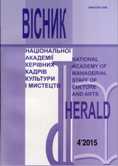ПРОБЛЕМА КРИЗИ МЕНТАЛЬНОЇ ІДЕНТИЧНОСТІ В ЄВРОПЕЙСЬКОМУ МУЛЬТИКУЛЬТУРНОМУ ПРОСТОРІ
The problem of mental identity crisis in the European multicultural space (the ways to overcome)
Author(s): Lyubov Volodymyrivna LysenkoSubject(s): Customs / Folklore, Ethics / Practical Philosophy, Ethnohistory, Cultural Anthropology / Ethnology, Sociology of Culture, Sociology of Politics
Published by: Національна академія керівних кадрів культури і мистецтв
Keywords: mental identity crisis; ethnolinguоculture; multiculturalism; "ethnic paradox"; "ethnic renaissance"; the point of mental support;
Summary/Abstract: Within the frames of given article the author carries out the analysis of an ethnomental identity crisis that is shown in the context of linguacultural crisis. Both crises are determined by social and political factors. The author focuses on the place and the role of ethnic linguaculture in the conditions of the contradictory process of globalization and the search of ethnic mental originality.The article also describes the specific features of new ethnomental identity formation. It proves that crisis can have great potential for creative cultural renovation and linguacultural transformation. Other way the crisis of ethnomental identity is a necessary precondition for finding of a new identity for an ethnos, which ensures further cultural development. Therefore, crisis is a system phenomenon, which can be sometimes really necessary.European ethnomental identity has developed over a long time on the historical, ethic, religious and linguacultural grounds. It is necessary to reconsider the concept of European ethnomental identity in the EU multicultural crisis conditions.Ever since Huntington proposed his "Clash of civilizations" thesis there has been a vigorous debate over it. While Huntington’s thesis contains several arguments, perhaps the most well known is the argument that the end of the Cold War resulted in a change in the nature of world conflict, with post-Cold War conflicts being based more on culture, mostly defined by religion, than those that occurred during the Cold War. He argues that during the Cold War, most of the world’s conflicts were between Western ideologies (the conflict between democracy and communism), but now that the Cold War is over, most of the world’s conflicts will be between cultures and civilizations, specifically between the West and the non-West. Huntington also predicted that, in particular, there will be increasing clashes between the West and both the Islamic and Sinic/Confucian cultures.These debates are necessary for modern European states to define urgently the positions in relation to the most dangerous tendency of globalization to the crash of the politic of multiculturalism and intercultural integration.Hundreds of thousands of people fleeing war and searching for a better life, have crossed into Europe last decades often by perilous means. Immigrants in significant numbers come to Europe from all over the world. This ever-increasing influx of migrants from nations such as Syria, Eritrea and Iraq has left European countries struggling to cope with a growing humanitarian disaster. As a result, cultural, religious and linguistic diversity strongly increased in Europe.The dilemma of immigration and ethnomental identity of the European states ultimately converges with the larger problem of the valuelessness of the multicultural politic in postmodernity. According to multiculturalism’s critics, Europe has allowed excessive immigration without demanding enough integration – a mismatch that has eroded social cohesion, undermined national and ethnomental identities, and degraded public trust. Multiculturalism’s proponents, on the other hand, counter that the problem is not too much diversity but too much racism. The article discusses the symbolic framework of immigrant`s integration problems into new culture, language and religion.Immigrants are compelled to integrate into new ethnic societies of new motherland, thus trying to preserve their own ethnomental identity and national traditions. In this context, the example of the immigrants who try or not try to become an integral part of the European society is indicative. Multiculturalism as political approach seems to be fading in Western Europe. It forces upon us in a particularly acute way discussion of the question "Who are we?" – posed by Samuel Huntington. As a result, the globalization became an important stimulating factor for ethnic renaissance or ethnic paradox of postmodern in the European states. Historical memory has become an important constituent of ethnic identity. The process of restoration of the lost traditions inevitably makes actual a question of revealing mechanisms of national-cultural heritage preservation.
Journal: Вісник Національної академії керівних кадрів культури і мистецтв
- Issue Year: 2015
- Issue No: 4
- Page Range: 38-43
- Page Count: 6
- Language: Ukrainian

